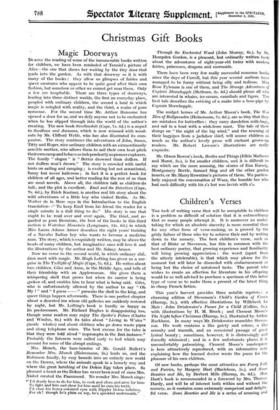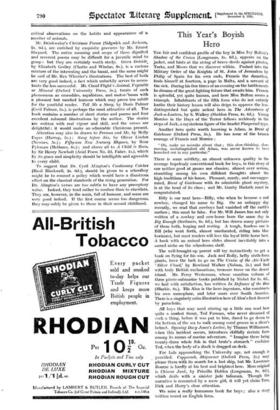Children's Verses
THE task of writing verse that will be acceptable to children is a problem so difficult of solution that it is extraordinary that so many people attempt it. It is moreover an under- taking for which an absolute sincerity is more essential than for any other form of verse-making, as is proved by the grisly failure of those who try to achieve their end by writing down to the nursery. The best children's verse, such as that of Blake or Stevenson, has this in common with the best ordinary poetry, that growing experience and familiarity will bring growing appreciation : the worst (apart from the utterly intolerable), is that which may please for the moment but will later be discarded with embarrassment as being but the choice of untutored taste. The parent who wishes to create an affection for literature in his offspring would be as well advised to purchase a specimen of this latter type of verse as to make them a present of the latest thing in cheap French fiction.
This year's harvest provides three notable reprints : charming edition of Stevenson's Child's Garden of Verses (Harrap, 5s.), with effective illustrations by Willebeck Le Mair : John Drinkwater's Poems for a Child (Collins, 5s.), with illustrations by H. M. Brock ; and Clement Moore's The Night before Christmas (l;iarrap, 5s.), illustrated by Arthur Rackham. In many ways Mr. Drinkwater resembles Steven- son. His work contains a like gaiety and colour, a like serenity and warmth, and an occasional passage of great lyrical beauty ; sometimes, however, it, is distressingly and forcedly whimsical ; and in a few unfortunate places it is uncomfortably patronizing. Clement Moore's masterpiece is here attractively reproduced, with an informative note explaining how the learned doctor wrote the poem for the pleasure of his own children.
Of new books, perhaps the most attractive are Furry Folk and Fairies, by Margery Hart (Maclehose, 5s.), and Some Beasties and Me, by Herbert Mills (Harrap, 3s. 6d.). Miss Hart's book is recommended in a forewerd by Mrs. Thomas Hardy, and will be of interest both within and without the nursery, as it.coritains.same extremely competent and delight- ful verse. Some Beasties and Me is a series of amusing and critical observations on the habits and appearances of .a number of animals.
Mr. Drinkwater's Christmas Poems (Sidgwiek and Jackson. 2s. 6d.), are enriched by exquisite gravures by Mr. Ernest Shepard. The entire meaning and scope of these dignified and reverent 'poems may be difficult for a juvenile mind to grasp : but they are certainly worth study. Green Outside, by Elizabeth Godley (Chatto and Windus, Os.), is a curious mixture of the interesting and the banal, and the same might be said of Mr. Rex Whistler's illustrations. The best of both are very good indeed, a fact which unluckily serves to accen- tuate the less successful. Mr. Claud Flight's Animal, Vegetable Or Mineral (Oxford University Press, 5s.), treats of such phenomena as crocodiles, aspidistras, and motor-'buses with a pleasant but rarefied humour which may prove too subtle for the youthful reader. Tell Me a Story, by Doris Palmer
Cecil Palmer, 5s.), is perhaps the most attractive of all. The book contains a number of short stories and poems and four excellent coloured illustrations by the author. The stories are written with real vigour and skill, and the verses are delightful : it would make an admirable Christmas present.
Attention may also be drawn to Persons and Me, by Molly Capes (Harrap, 5s.) ; Sung before Six, by Oliver Linden (Newnes, 5s.) ; Fifty-one New Nursery Rhymes, by Rose Fyleman (Methuen, Os.) ; and above all to A Child is Born, by Sir Henry Newbolt (Ariel Poem No. 32, Faber, Is.), which by its grace and simplicity should be intelligible and agreeable to every child.
To suggest that Dr. Cyril Alington's Cautionary Catches (Basil Blackwell, 2s. 6d.), should be given to a schoolboy might be to counsel a policy which would have a disastrous effect on the classical standards of the rising generation. For Dr. Alington's verses are too subtle to have any pre.ceptory value. Indeed, they tend rather to confuse than to elucidate. They are, however, in the main, full of humour, and some are very good indeed. If the first course seems too dangerous, they may safely be giVen to those in their second childhood.











































 Previous page
Previous page